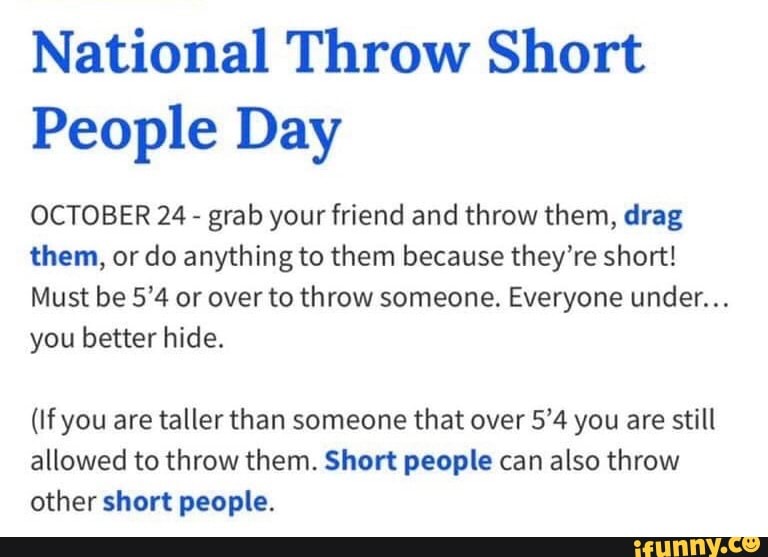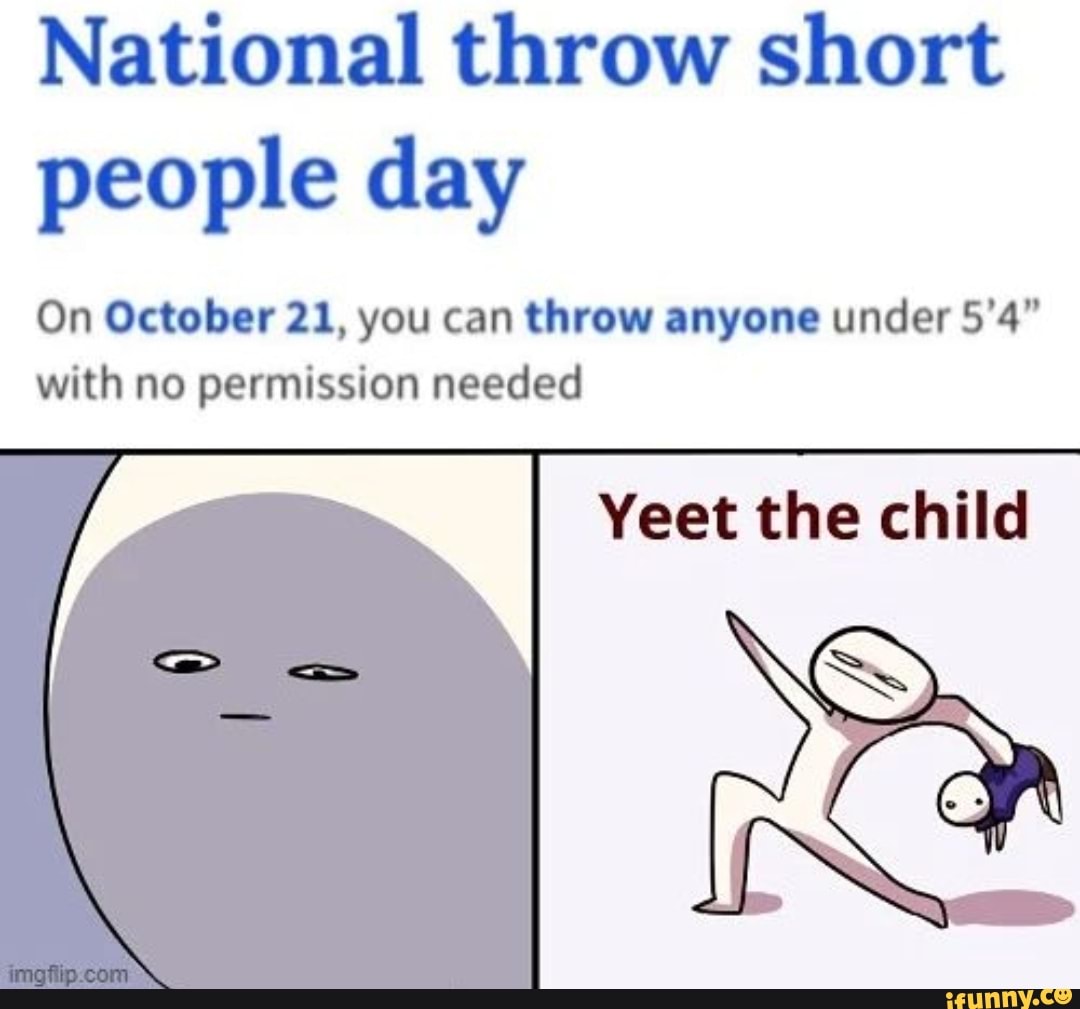National Throw Short People Day: Fact Vs. Fiction & More!
Is it ever okay to make light of someone's physical characteristics? The internet's fascination with "National Throw Short People Day" brings this very question to the forefront, highlighting the delicate balance between humor and potentially harmful stereotypes. It's a phenomenon that deserves a closer look, not just for the sake of political correctness, but for understanding how online trends can shape perceptions and impact individuals.The concept, which resurfaces periodically online, typically around October 21st or 22nd, isn't rooted in any official decree or historical event. It's purely a product of internet culture, where jokes and memes related to height have become surprisingly common. Variations even include "National Thrown by Short People Day" observed around October 25th, or even a "National Kick Tall People Day," showcasing the somewhat bizarre and often contradictory nature of online humor. The core idea revolves around the humorous, albeit metaphorical, act of "throwing" short people. And to be absolutely clear, it's intended as a joke a potentially misguided one, but a joke nonetheless. The intent, supposedly, is to be lighthearted, but the reality is far more nuanced.While some may see it as harmless fun, others find it perpetuates negative stereotypes and contributes to a culture of body shaming. The line between playful banter and hurtful discrimination can be razor-thin, and what one person finds amusing, another may find deeply offensive. This is where the complexities of online humor come into play. The internet, with its echo chambers and anonymity, can amplify both the positive and negative aspects of human interaction. What starts as a seemingly innocuous joke can quickly escalate into a full-blown controversy, especially when sensitive topics like physical appearance are involved. The meme-like nature of "National Throw Short People Day" allows for personal interpretation, some add funny captions while others add exaggerated videos or sarcastic takes. It is this flexibility that makes the meme relevant for longer period of time. The core of the question remains the same, is it a harmless joke or a harmful stereotype?The internets long memory further complicates things. What might seem like a fleeting joke today can resurface years later, potentially causing harm to individuals who may have forgotten about it or were unaware of its initial existence. This raises important questions about online responsibility and the long-term consequences of our digital interactions. The origins of these types of internet jokes remain a mystery, much like "National Throw Shade Day", they seem to evolve from internet culture.To better understand the social and psychological implications of "National Throw Short People Day," we spoke with Dr. Sarah Williams, a psychologist specializing in social behavior and discrimination. Dr. Williams shed light on the potential impact of such memes on individuals, particularly those who may already feel self-conscious about their height. She emphasized that even seemingly harmless jokes can contribute to feelings of exclusion, inadequacy, and low self-esteem. "The constant exposure to jokes about a particular characteristic, even if they are intended to be funny, can reinforce negative stereotypes and create a sense of otherness," Dr. Williams explained. "It's important to be mindful of the potential impact of our words and actions, both online and offline."
The narrative surrounding "National Throw Short People Day" needs to shift. It's not about censoring humor entirely, but about fostering a more inclusive and respectful online environment. This starts with individual awareness and a willingness to challenge potentially harmful jokes and stereotypes. By choosing to be mindful of the impact of our words, we can contribute to a more positive and equitable online culture.It's also important to remember that humor is subjective. What one person finds funny, another may find offensive. Therefore, it's crucial to be sensitive to the perspectives of others and to avoid making generalizations or assumptions about entire groups of people. Instead of perpetuating potentially harmful stereotypes, we can use humor to celebrate diversity and promote understanding.There are many ways to change the narrative around "National Throw Short People Day." One approach is to create counter-memes and jokes that challenge the original concept and promote positive messages about height and self-esteem. Another is to engage in open and honest conversations about the potential harm of height-based discrimination and to educate others about the importance of inclusivity.In contrast to "National Throw Short People Day," "National Short Person Day," observed annually on December 22nd, serves as a powerful reminder that good things often come in small packages. This day is dedicated to celebrating the contributions of short people to society and promoting a more inclusive and respectful environment for individuals of all heights.The origins of "National Short Person Day" can be traced back to 1992, when it was established as a platform for raising awareness, promoting equality, and celebrating the diverse abilities and accomplishments of short people. Unlike the internet-born "National Throw Short People Day," this day is rooted in a genuine desire to foster understanding and combat discrimination.On May 8, 2025, being the 128th day of the year, it's a reminder that every day has special significance for someone. While not directly related to height, these reminders of inclusivity and recognition are vital in a world where differences can sometimes be the target of ridicule. Instead of focusing on divisive concepts, celebrating days like "National Short Person Day" acknowledges the significant contributions that short people make to society, fostering an environment where everyone, regardless of height, feels valued and respected.It's also crucial to acknowledge the existence of "National Kick Tall People Day," which, similar to "National Throw Short People Day," is a satirical online jest. These seemingly opposing "holidays" highlight the absurdity of focusing on physical characteristics as a basis for humor or discrimination.Instead of engaging in potentially harmful jokes, we can use our online platforms to promote positive messages about body positivity, self-acceptance, and respect for others. This can involve sharing stories of successful short people, highlighting the achievements of individuals who have overcome height-based challenges, or simply using our voices to speak out against discrimination and prejudice.Congratulating short friends on "National Short Person Day" with thoughtful gifts or organized celebrations is a wonderful way to acknowledge their value and contributions. Those who identify as short can treat themselves to something special, further reinforcing self-love and appreciation.The debate surrounding "National Throw Short People Day" underscores the broader conversation about humor and boundaries in the digital age. As social media continues to evolve, it's essential to develop a critical awareness of the potential impact of our online interactions. By fostering a culture of empathy, respect, and inclusivity, we can create a more positive and equitable online world for everyone.The fact is, height is just one aspect of a person's identity. It doesn't define their worth, their abilities, or their potential. By focusing on what truly matters character, intelligence, kindness, and compassion we can move beyond superficial judgments and create a more inclusive and accepting society for all.Even outside of the online realm, historical practices, like the ancient Samhain tradition of throwing cats into fires, highlight the need for ethical considerations in cultural practices. While seemingly unrelated to height, it underscores the importance of examining traditions and challenging those that perpetuate harm or discrimination.In the United States, where the average height for men is around 5'9" and for women around 5'4", those below these averages might especially appreciate the sentiment behind "National Short Person Day" on December 22nd. It's a reminder that value exists in all sizes.Ultimately, the choice is ours. We can either perpetuate harmful stereotypes and contribute to a culture of discrimination, or we can choose to be part of the solution by promoting empathy, respect, and inclusivity. By embracing diversity and celebrating the unique contributions of all individuals, regardless of height, we can create a more positive and equitable world for everyone. It is time to scrape the online archives to reveal that there is no holiday for national throw short people day but a jovial jest embraced by social media patrons around the world.Looking at more general knowledge, the fact that muscles contract after death, causing hair follicles to appear as though hair is standing on end, serves as a reminder of the complexities of the human body. This and other interesting facts can serve as conversation starters that move away from superficial topics and towards more engaging discussions.Focusing on positive actions, like understanding and celebrating "National Short Person Day 2024" helps to build a more inclusive society. This type of acknowledgment fosters mutual respect and understanding. The meme circulating around "National Throw Short People Day" is not officially recognized, and it's important to remember this distinction. It exists solely as an internet phenomenon. As the name suggests, the holiday suggests "throwing" shorter people, and the term has gained traction on social media as a humorous meme.Changing perspectives starts with understanding. Learning about the history of "National Short Person Day" and the reasons behind its establishment can foster empathy and counter the potentially harmful effects of memes like "National Throw Short People Day."Therefore, let us strive to make the online world a place of understanding, respect, and inclusivity, where everyone feels valued and appreciated, regardless of their height or any other physical characteristic. It's about creating a society where everyone feels empowered to reach their full potential, free from the burden of prejudice and discrimination.This means challenging ourselves to think critically about the messages we consume and share online, and to be mindful of the potential impact of our words and actions on others. It also means supporting organizations and initiatives that promote equality and inclusion, and working to create a world where everyone has the opportunity to thrive.The term national throw short people day is not an official holiday but a fictional internet joke.



| Full Name | Sarah Williams |
| Profession | Psychologist specializing in social behavior and discrimination |
| Area of Expertise | Social Psychology, Discrimination, Impact of Social Media on Mental Health |
| Educational Background | Ph.D. in Psychology, [University Name] M.A. in Psychology, [University Name] B.A. in Psychology, [University Name] |
| Research Focus | The impact of social media on self-esteem and body image. The psychological effects of discrimination and prejudice. The role of social support in mitigating the negative consequences of discrimination. |
| Publications | [List of publications, if available. Example: "Williams, S. (2020). Social Media and Body Image. Journal of Social Psychology, 140(2), 200-215."] |
| Professional Affiliations | American Psychological Association (APA) Society for Personality and Social Psychology (SPSP) |
| Contact Information | [Contact information, if publicly available and with permission.] |
| Website | American Psychological Association |
- The Untold Story Of Band Of Brothers Captain Sobel Fact Vs Fiction
- Claudia Heffner Peltz Model Wife Philanthropist Full Story

National Throw Short People Day OCTOBER 24 grab your friend and throw

I TOP DEFINITION National throw short people day On October 21, you can

Celebrating National Throw Short People Day A Day Of Humor And Awareness